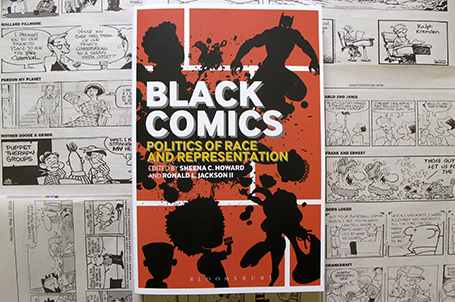Tuesday, May 13, 2014
Dr. Sheena C. Howard’s book explores race and representation in comics
by Adam Grybowski
Dr. Sheena C. Howard’s first book, Black Comics: Politics of Race and Representation, has been nominated for an Eisner Award, propelling her — an entrant into the world of comics — into the ranks of its most acclaimed artists, writers and creators.
Officially called the Will Eisner Comic Industry Awards, the Eisner Awards are considered the Oscars for comics and are the highest acknowledgement one can receive in the industry. Howard, an assistant professor in the Department of Communication and Journalism in the College of Liberal Arts, Education and Sciences since 2011, will vie for Best Scholarly/Academic Work.
“To be nominated on a scale of this magnitude at such an early time in my career — I still can’t believe it,” she says.
The book is a collection of critical perspectives on how black comic artists have represented and explored the African American experience. Howard is the first editor of the book along with second editor Ronald L. Jackson II, a faculty member of McMicken College of Arts and Sciences at the University of Cincinnati. “The goal is to call attention to the salient themes around race, gender and representation prevalent in historical and contemporary comics,” she writes in the book.
Far from a lifelong fan, Howard had never even owned a comic until as recently as a year and half ago. “When I started my Ph.D., if you would have told me I would be writing about comics, I would’ve said, ‘How the heck is that going to happen?’” she says.
She cites the sheer amount of material as one barrier to entering the field. Following Batman or Spiderman on their superhero adventures has spawned thousands of editions over the decades. “It’s overwhelming, but you can start anywhere.” she says. “You can become interested any time.”
She started with The Boondocks, a daily strip that ran from 1996 to 2006. Aaron McGruder originally wrote and drew the strip, which featured two African American boys assimilating to the suburbs. It often addressed politics and popular culture and, along the way, attracted a big audience that crossed racial lines.
The humor was savvy enough that readers of different races were often laughing at the same jokes but for different reasons, Howard says. She became curious about how the strip achieved its effect — and its popularity. The Cartoon Network adapted The Boondooks for TV, and the show premiered on Adult Swim in 2005. “Very rarely does something like that reach mainstream syndication,” she says, adding that, going back to the 1920s, no more than eight nationally syndicated strips centering on African Americans reached a mainstream audience.
Having first seen the comic around 2007, she says it peaked during the presidency of George W. Bush. “It was relevant, I could relate to it and it was funny,” says Howard, who earned a bachelor’s degree from Iona College and a master’s from New York Institute of Technology. “I was fascinated by the strip because it was about African American people by an African American artist.”
Black Comics eventually grew out of Howard’s dissertation at Howard University, The Continuity and Extension of African-American Communication Dynamics through Black Comics Strips. Since its publication, the book has attracted enough attention that Howard regularly appears at conventions and other comic-book gatherings, feeding the steady appetite of a hungry fan base.
She will appear at the awards ceremony at Comic Con from July 24-27 in San Diego, Calif. The event sold out long ago. The 2012 convention in San Diego attracted more than 130,000 people.
As a result of becoming the focus of such enthusiastic fans, “I’m kind of forced to expand my knowledge base of comics,” Howard says. “This thing keeps following me. Comics used to be for nerds, but they’re becoming more mainstream, they’re becoming popular culture, and I’m following suit.”

